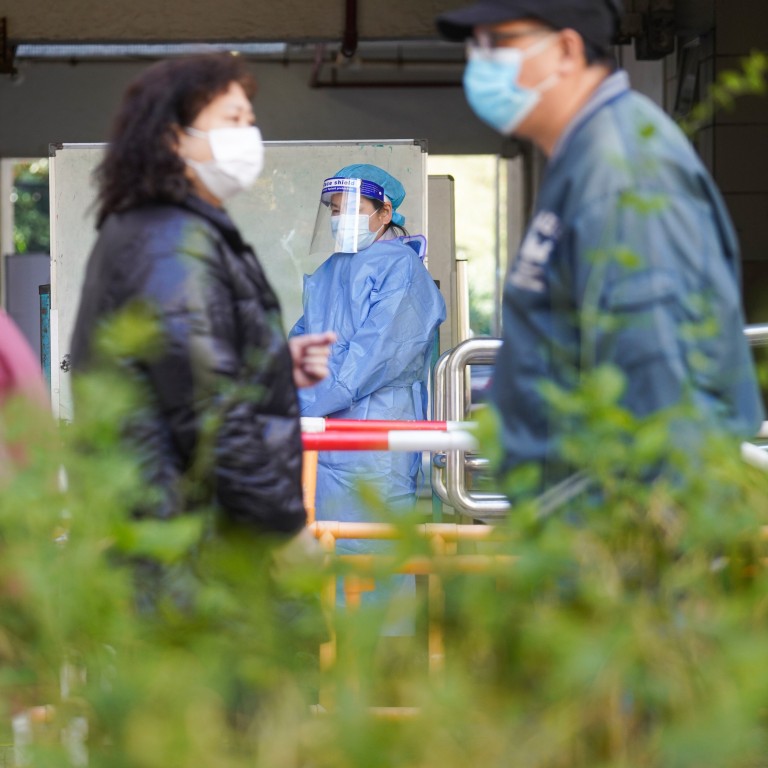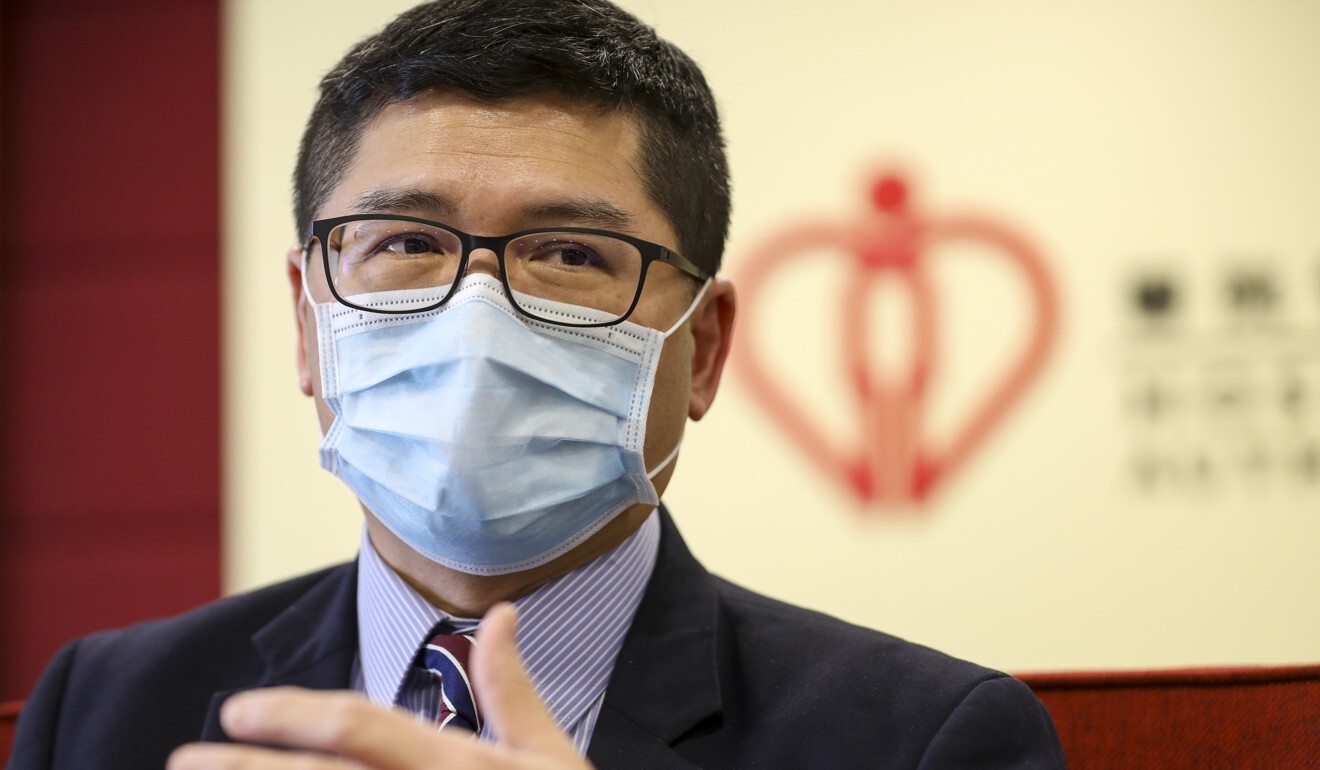
Hong Kong to roll out mass coronavirus vaccinations in February, minister says, as city records 35 new Covid-19 cases
- Government medical adviser says Sinovac and AstraZeneca shots will be offered in clinics, while Pfizer ones will be administered at community halls
- First 1 million doses will go to health care workers and people in high-risk groups, source reveals
Secretary for the Civil Service Patrick Nip Tak-kuen said in a Facebook post on Saturday that the government aimed to wrap up preparatory work on the vaccination campaign by the end of this month and launch it in February.
The first million doses for 500,000 people would go to health care workers, carers in homes for the elderly and people with disabilities, and residents aged 85 years or above, in line with the prioritisation of high-risk groups in vaccination programmes rolled out in nations such as Britain and the United States, according to a government source.
The insider said the first shots to be used would be whichever of the three brands the government ordered arrived first.

07:34
World bids farewell to 2020 as Covid-19 mutes New Year celebrations
Professor David Hui Shu-cheong, a Chinese University respiratory medicine expert who advises the government on the pandemic, revealed that officials planned to conduct inoculations with the Sinovac and AstraZeneca-Oxford vaccines at Department of Health and Hospital Authority clinics, as those vaccines could be stored at temperatures of between 2 and 8 degrees Celsius. Private practitioners could also be roped in to help with giving the shots.
The jabs by Pfizer-BioNTech were likely to be administered in community halls, as they involved more complicated technologies of ultra-cold storage at minus 70 degrees. Those receiving jabs are advised to wait about 15 minutes to see whether they have any immediate adverse reactions.
The government was talking with other countries about allowing recognition of Hong Kong’s digital system recording a person’s Covid-19 vaccination history, according to Secretary for Innovation and Technology Alfred Sit Wing-hang.
The developments came as the city reported 35 new coronavirus infections on Saturday, setting a fresh low since the fourth wave of infections began. Forty-two cases were reported the day before, the fewest since November 20 when 26 infections were confirmed.
Ten of Saturday’s cases were untraceable, the lowest number in more than a month.
The city’s total infection tally stood at 8,923. More than 40 people tested preliminary-positive for the virus. The death toll rose to 150, after an 88-year-old Covid-19 patient with chronic illnesses became the latest fatality.
At a regular Covid-19 press briefing, Dr Chuang Shuk-kwan, head of the Centre for Health Protection’s communicable disease branch, said genetic analysis revealed one more traveller from South Africa carried a mutated, more transmissible variant of the virus from that country, on top of another case announced previously.
Explainer: How Hongkongers can safeguard their living environment against Covid-19
Two family members returning from Britain also carried a new strain from the European nation, taking Hong Kong’s total number of patients infected with that variant to 10.
The health official added that three more buildings – Wah Po Mansion in Sham Shui Po, Shui Pin Wai Estate’s Chuen Shui House in Yuen Long and Lohas Park Almond Blossom (Tower 9 – L Wing) of La Splendeur in Tseung Kwan O – had met the new threshold of having two or more unrelated infections, so residents and recent visitors would have to undergo mandatory testing.
“This is under the legal notice, so if residents do not comply with the legal notice it is an offence,” Chuang warned.
Hui said the government was considering involving non-public health personnel in its response to the virus, though the plans had not been confirmed. He said the extra manpower from the immigration and customs departments would focus on contact tracing, rather than doing the actual swabbing.
Hong Kong has mostly leaned on the health department and Hospital Authority – as well as private medical facilities more recently – to provide testing and set up temporary sample collection stations near buildings where infections have emerged.

But the recent lowering of the threshold for ordering mandatory testing saw an additional 43 buildings across the city issued such orders in a single day this week, putting an additional squeeze on testing capacity.
By 5pm on Saturday, more than 35,000 residents and people who had recently visited the 43 buildings underwent screening at mobile specimen collection stations or other testing facilities that were arranged for the scheme.
That figure represents an estimated 60 per cent of the residents subject to the testing order, but the Home Affairs Department noted some people might have opted for other ways to get their screening done. Those who have not taken a test must still comply with the Monday deadline.
A separate government source said typically more than 90 per cent of residents had followed previous mandatory testing orders and authorities would also follow up on enforcement using measures such as unannounced checks, which had been carried out at the Ming Yan Lau block of Sha Tin’s Jat Min Chuen estate.
Hui said the tightening of the testing regime was decided upon after a recent meeting and exchange of views with infectious disease experts in mainland China. “They are even more stringent. They will declare war when there are one or two cases, and put an area under lockdown,” he said.
He added mainland authorities would trace not just the close contacts of Covid-19 patients, but also those of the close contacts.
Ko said the regular testing scheme could start with staff in special care services, such as those responsible for outreach programmes to homes for the elderly, with screening to start possibly as early as next week. He added that the makeshift hospital near the airport was on track to be completed later this month and open in February.
In a blog post on Saturday, Secretary for Food and Health Professor Sophia Chan Siu-chee wrote that the government’s current screening strategy – involving mandatory testing for coronavirus-hit areas and people in certain “high-risk” occupations, along with voluntary screening for all residents – had yielded 1.56 million tests since mid-November and identified more than 3,000 patients.
The Food and Environmental Hygiene Department said it had conducted joint operations with police to enforce social-distancing rules in Sham Shui Po, Kowloon City, Tuen Mun, Yuen Long and North district on New Year’s Day.
A total of 895 catering venues and 181 other premises were inspected and the department initiated prosecutions against 12 businesses suspected of breaching current restrictions, such as by seating more than two people at a table or failing to set up partitions.
In the past week, a growing number of Hong Kong residents have headed to mainland China via the Shenzhen Bay Port and long queues were seen there on Saturday.
One resident complained he had waited for more than five hours for immigration checks because only a few mainland officers were deployed to examine Covid-19 test result documents.

